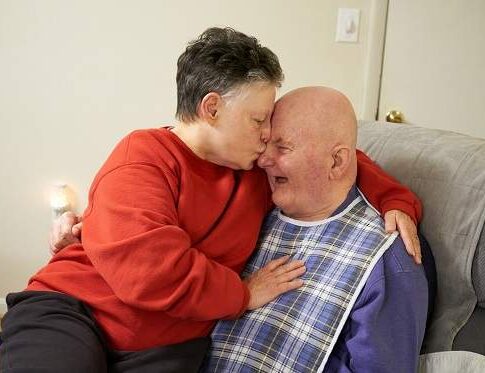The number of spousal caregivers in the United States is growing – nearly one-quarter, 22 percent, of the over 40 million caregivers in the United States are the spouse of a chronically ill, disabled or aged partner.
Caregiving to a parent is tough, but when it is a husband, wife, or partner you vowed “in sickness and in health”, this can be put to the test as you get older. There are still the usual challenges that come with caregiving responsibilities but when it’s also your partner in need of the care, this change can impact the marriage relationship, in ways such as:
- Marital Strain: Marriage isn’t always easy and when you add caregiving responsibilities for your spouse to the mix, it can affect your marriage. The care they need can change the dynamics of and put a strain on the relationship by:
- Posing a financial burden
- Cutting into your time together as a couple
- Cutting into the time you have for family matters, such as childcare and housework
- Causing frustration and fatigue
- Causing resentment of the loved one in need
- Creating tension or conflict between your spouse and other family members involved in your partner’s care
- Emotional impacts: Acting as a caregiver for a family loved one of any relationship can be emotionally draining, however, the emotions tied to your spouse can make the responsibilities of their care even more draining. While many seniors who are suffering from debilitating effects of aging or disease also suffer from depression, researchers have found that spousal caregivers may be likely to experience depression at an even higher rate than those for whom they care.
- Feeling of loss: Spousal caregivers often report feeling very alone in their roles, despite spending nearly all their time with their significant other. The change in a relationship where you’re no longer partners but instead, one relies almost completely on the other, can cause the spousal caregiver to struggle with feelings of great loss, as if they’re suddenly caring for a completely different person. The associated loss of companionship and intimacy can also be devastating. Spousal caregivers can also grow to resent the needier member of the relationship.
- Physical and emotional issues: Emotional strain can have an undeniable impact on the physical well-being of the spousal caregiver. The feelings of anger, anxiety, sadness, isolation, exhaustion – and the guilt for having these feelings – can take its toll. It’s important to recognize the emotional signs of caregiver stress and to seek help or support:
- Moodiness or mood swings
- Poor sleeping patterns
- Increased blood pressure
- Weight gain or loss
- Argumentative
- Irritability and feelings of frustration
- Memory problems and lack of concentration
- Headaches or physical symptoms
When you are a caregiver for your spouse, it is important to carve out time for yourself. It should be a priority to find respite care services in your local area to support you. Respite care is necessary for the health and well-being of the family or spousal caregiver to ensure that they can continue to provide care for their loved one. Respite care includes a variety of services such as home-based care, skilled nursing, dementia care, and companion care. A FirstLight® Home Care caregiver can help with everything from physical tasks to errands, meal preparation, senior transportation and more.
Are you caring for your spouse? What advice would you give a spouse who has recently started providing care for their partner? Feel free to comment below or join our conversation on our Facebook page.
We are proud to CHAMPION the family caregiver, offering empathy, advice, and support for those who provide countless hours of care to their loved ones. At FirstLight Home Care we want to provide a helping hand, relieve some of the stress that comes with caregiving and give you back a few hours in your overwhelmingly busy day.
SOURCE
AARP: www.aarp.org
WebMD: www.webmd.com
Revolution Health: www.revolutionhealth.com
Mayo Clinic: www.mayoclinic.org
